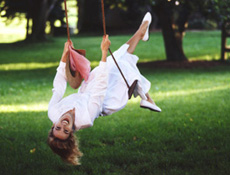In ancient cultures, April Fool's Day, which comes close to the first day of spring, marked the beginning of a new year. Then in 1582, Pope Gregory XIII ordered the use of the Gregorian calendar that made January 1 New Year's Day. Some people, however, didn't know about the new schedule, or perhaps they just didn't think it made any sense. They continued to celebrate on April 1 and were called "fools" for doing so. This is the origin of our annual day of pranks and practical jokes.
All the world's religions have holy fools, clowns, or tricksters who encourage us not to take ourselves too seriously. Through silly stories, surprise endings, and unexpected developments, they tease us into a fuller appreciation of the paradoxes and mysteries of life. Jesus incorporated some playful elements into his parables. St. Francis called his early followers "Jesters for the Lord." We are in excellent company when we celebrate April Fool's Day.
Play can be a spiritual practice. It encourages us to make space in our busy, driven, and achievement-oriented lives for just being silly. When we allow ourselves to have some fun, we often also find ways to express our creativity, to use our intuition and imagination, to experience joy and wonder, and to connect with our loved ones.
The thirteenth century abbess Mechtild of Magdeburg wrote of God telling her: "I, God, am your playmate. I will lead the child in you in wonderful ways, for I have chosen you." What a wonderful image — God as our playmate. As a couple who could be called "play challenged," we need this extra incentive to take time away from our work to simply enjoy ourselves, each other, and the pleasures of God's creation.
 Spiritual Practices
Spiritual Practices
Here are some ways you can make your playtime into spiritual time.
- Find ways to be playful at work. One of our friends collects cartoons and posts them on the door to her office. She notices that her workmates stop by regularly for a chuckle.
- Spend some time playing with children or with your pets. Notice how they manage to focus on whatever they are doing. Practice letting other concerns go when you are playing.
- See your play as an opportunity to sense God's presence and love. Catholic sister Jose Hobday writes in Stories of Awe and Abundance: "I love to play with God as I were a child playing with my parents. I love going to a playground, getting in a swing and swinging high, because I believe that God lives in us through the joy and the power we sense when we swing high."
- Be spontaneous with your prayer. This will make it more playful. For example, we sometimes exclaim "Good going, God" when we see a beautiful sunset. When we feel especially blessed, we express our gratitude by clapping.
- Enjoy our 12s gallery of inspirational quotes, illustrated with photographs, that explores the spiritual practice of play.
- Julia Cameron, author of The Artist's Way, a classic manual on creativity, recommends that you set aside a few hours every week for an expedition to explore something interesting to your creative consciousness. It might be a visit to a gallery, a fabric store, an herb market, or the zoo. She calls this an "Artist's Date." We recommend you plan "Play Dates" as well, a few hours when you give yourself up to a game, tell jokes with friends, or go see a comedy at the cineplex. Remember to put these play dates on your calendar so that you don't forget them.
- We have always been very thankful for the lessons our Jewish friends have given us in keeping the Sabbath as a time for playfulness. The Sabbath is a day of worship and a day of rest, a time to catch our breath after a long week. But it is also a time for play, the companionship of family and friends, the pleasure of good food and conversation. As Martin Luther, initiator of the Protestant Reformation, said in his Table Talks: "Our loving God wills that we eat, drink and be merry."
